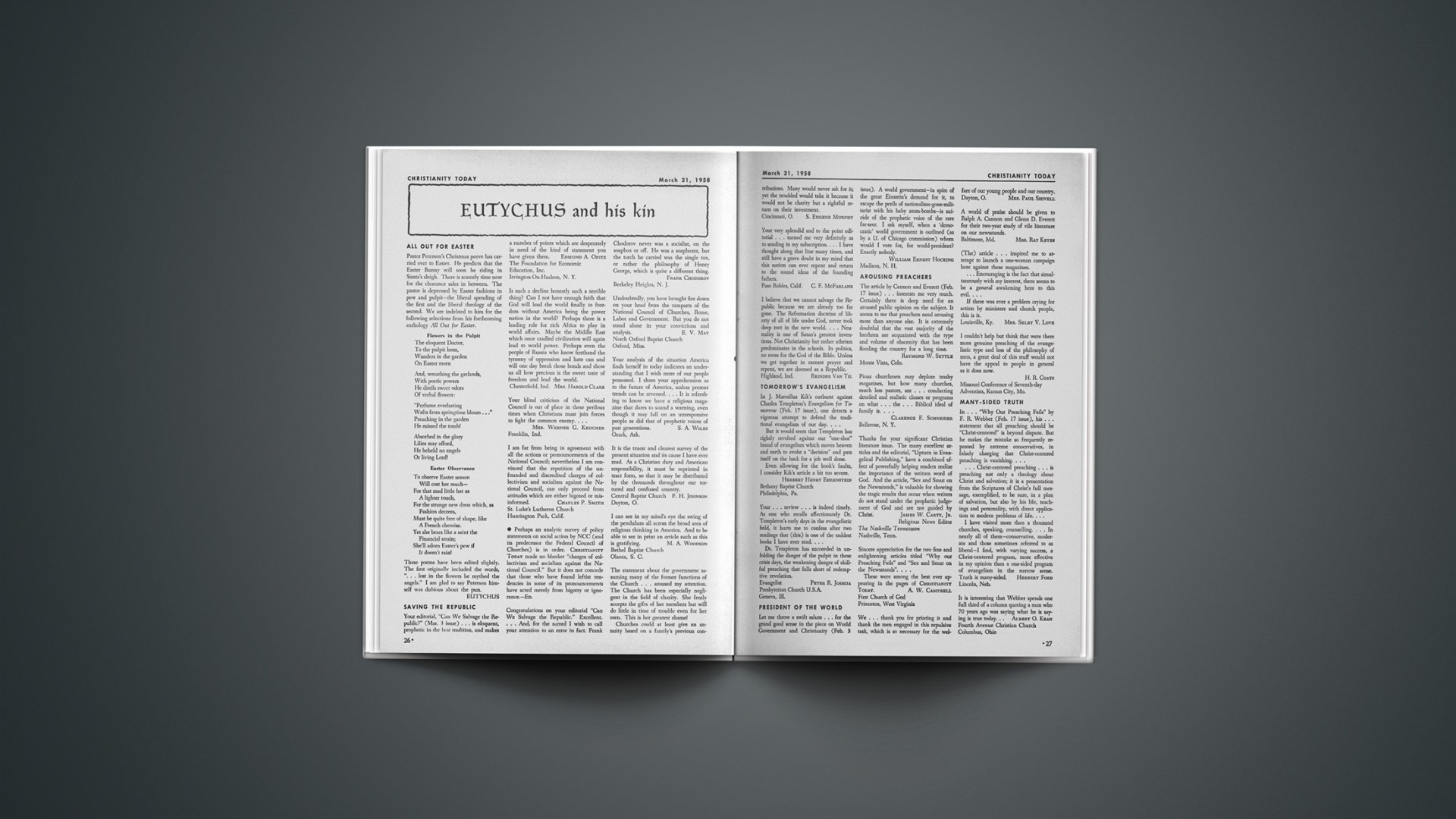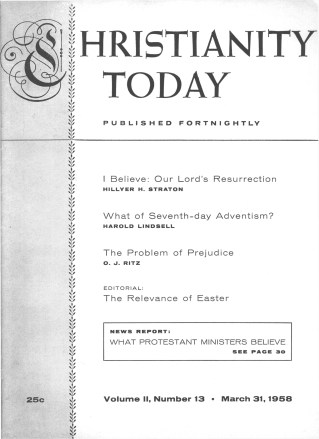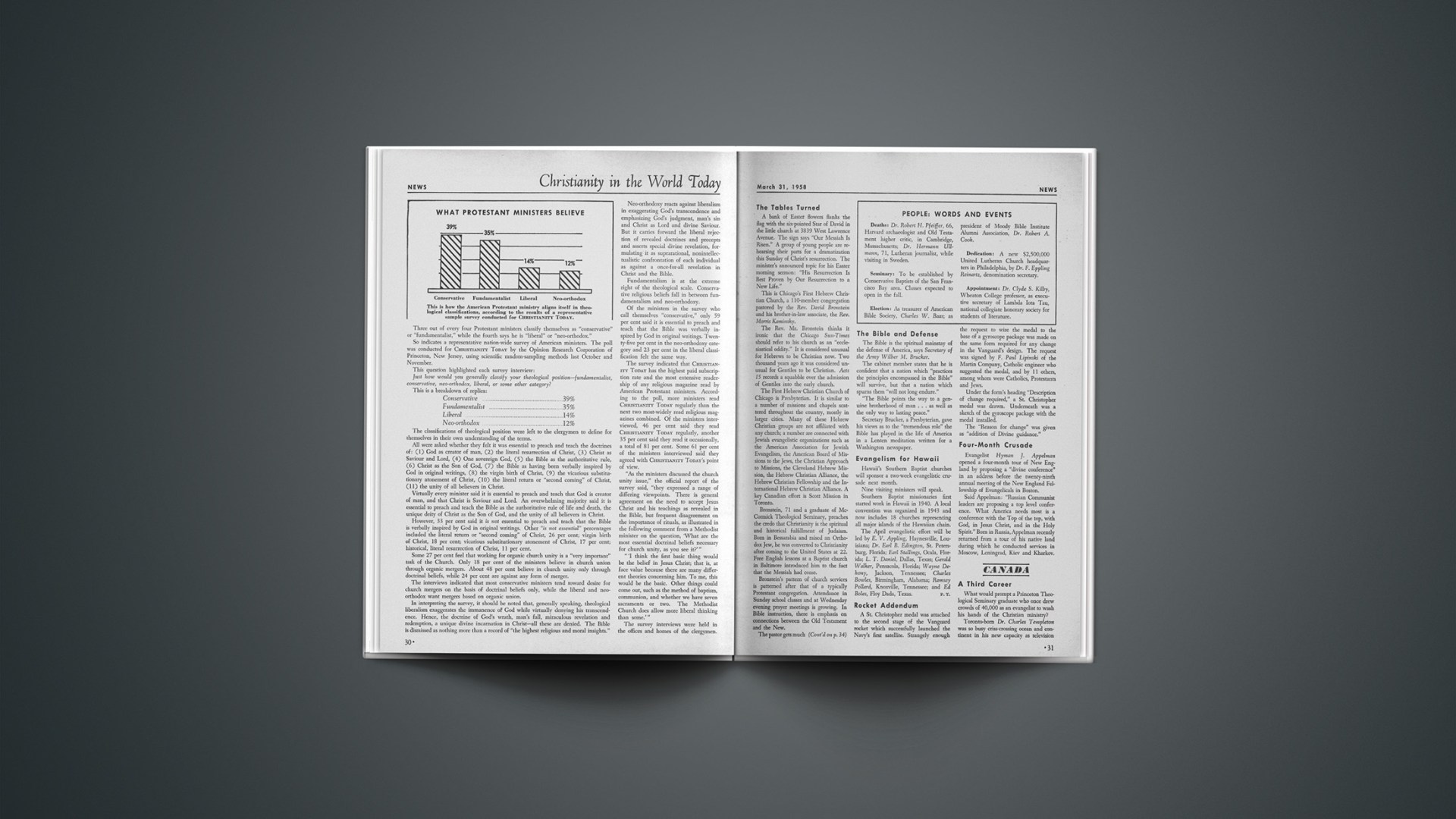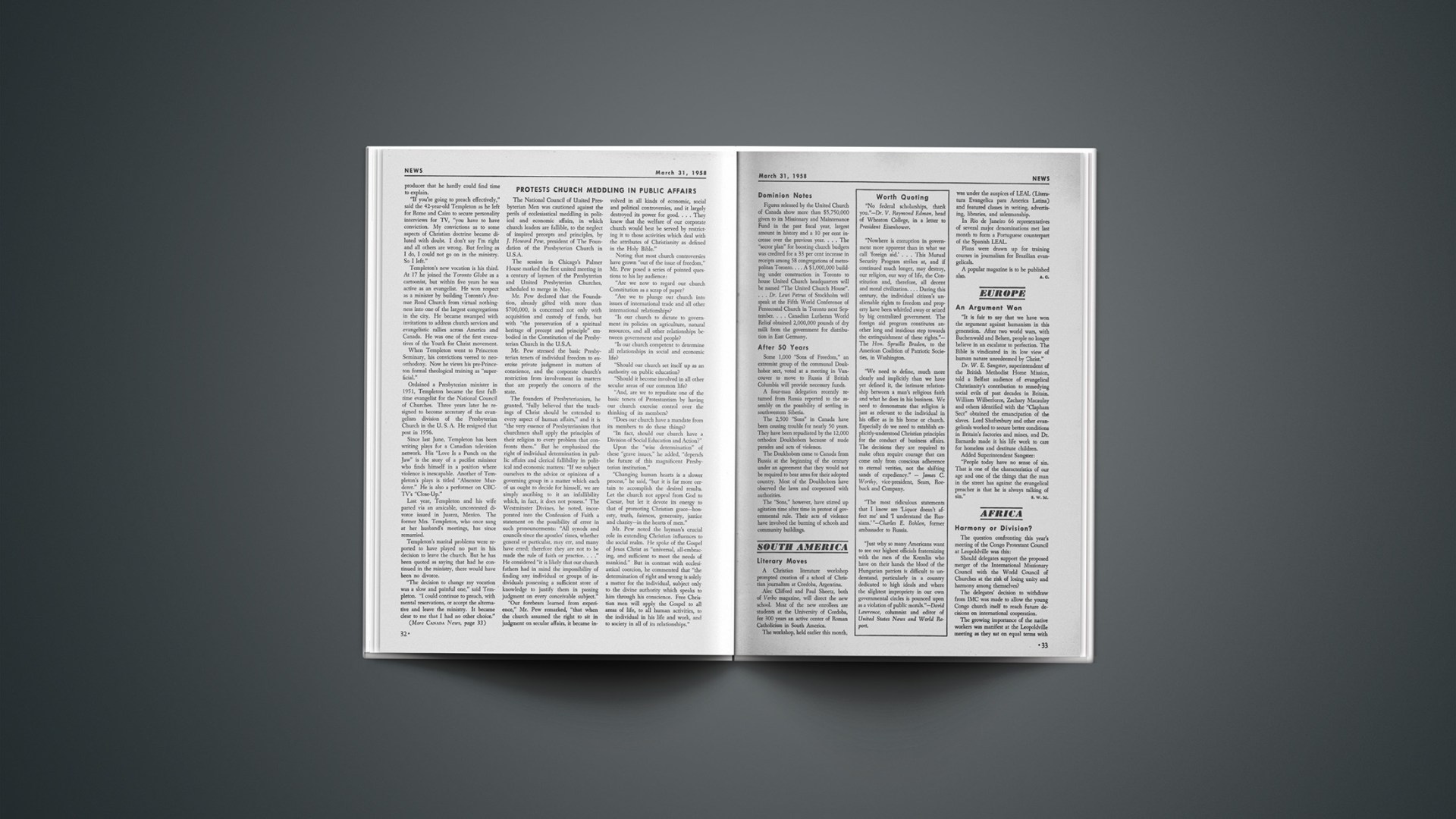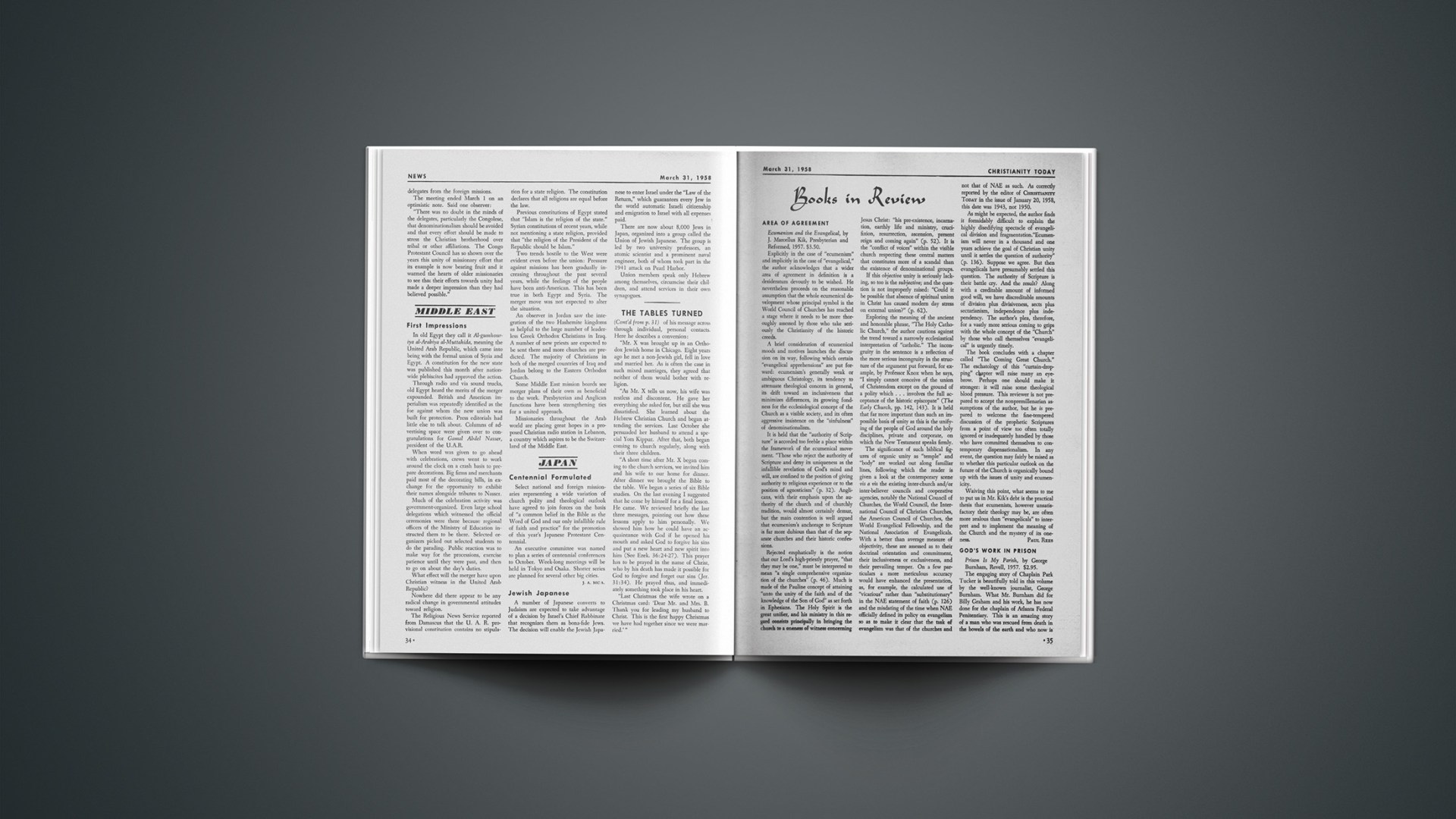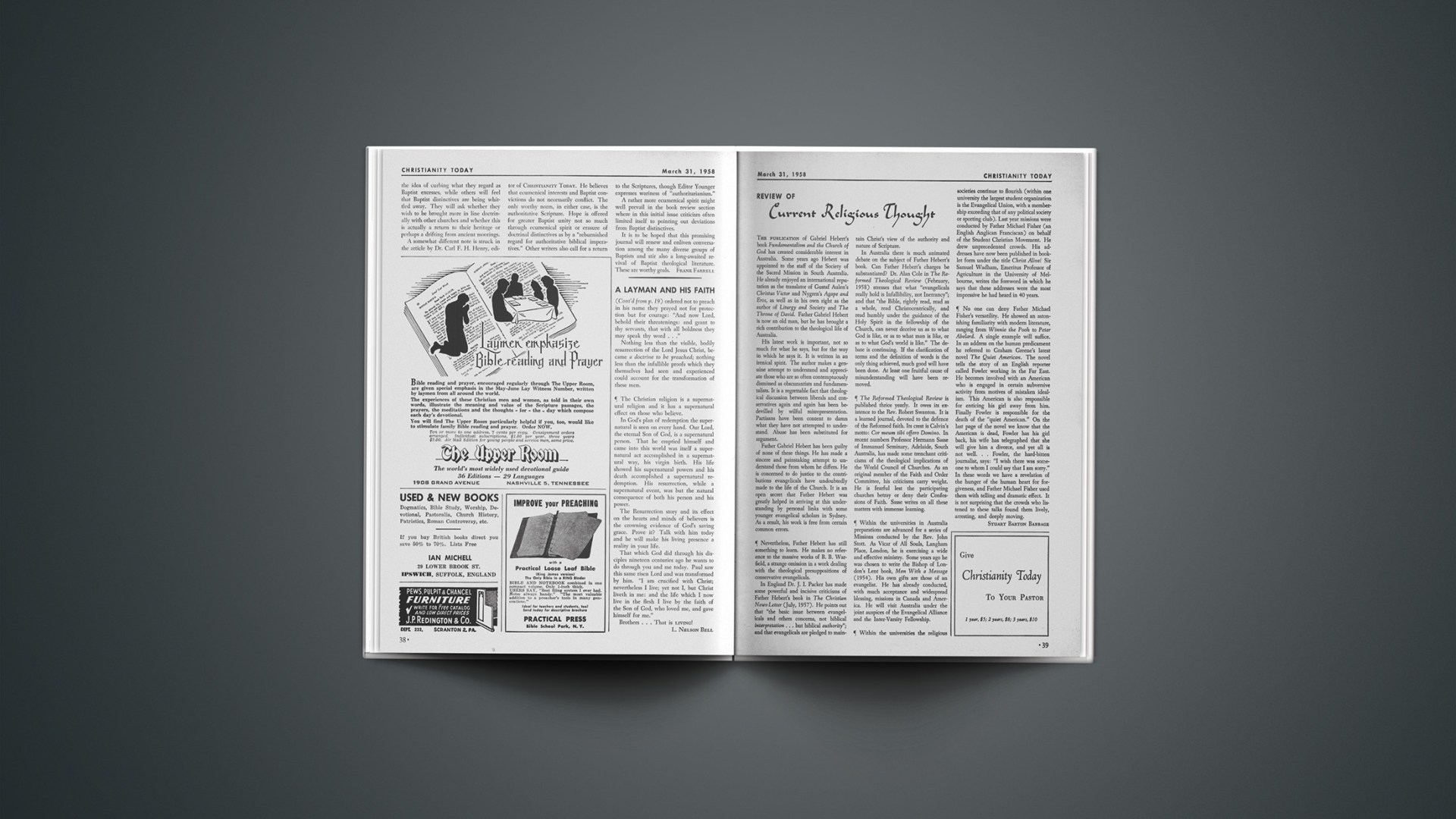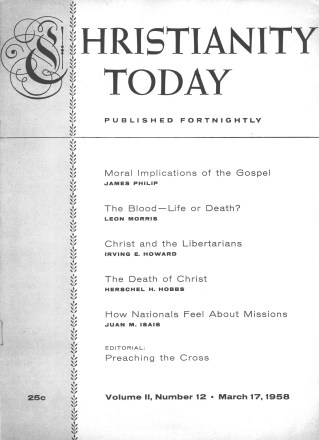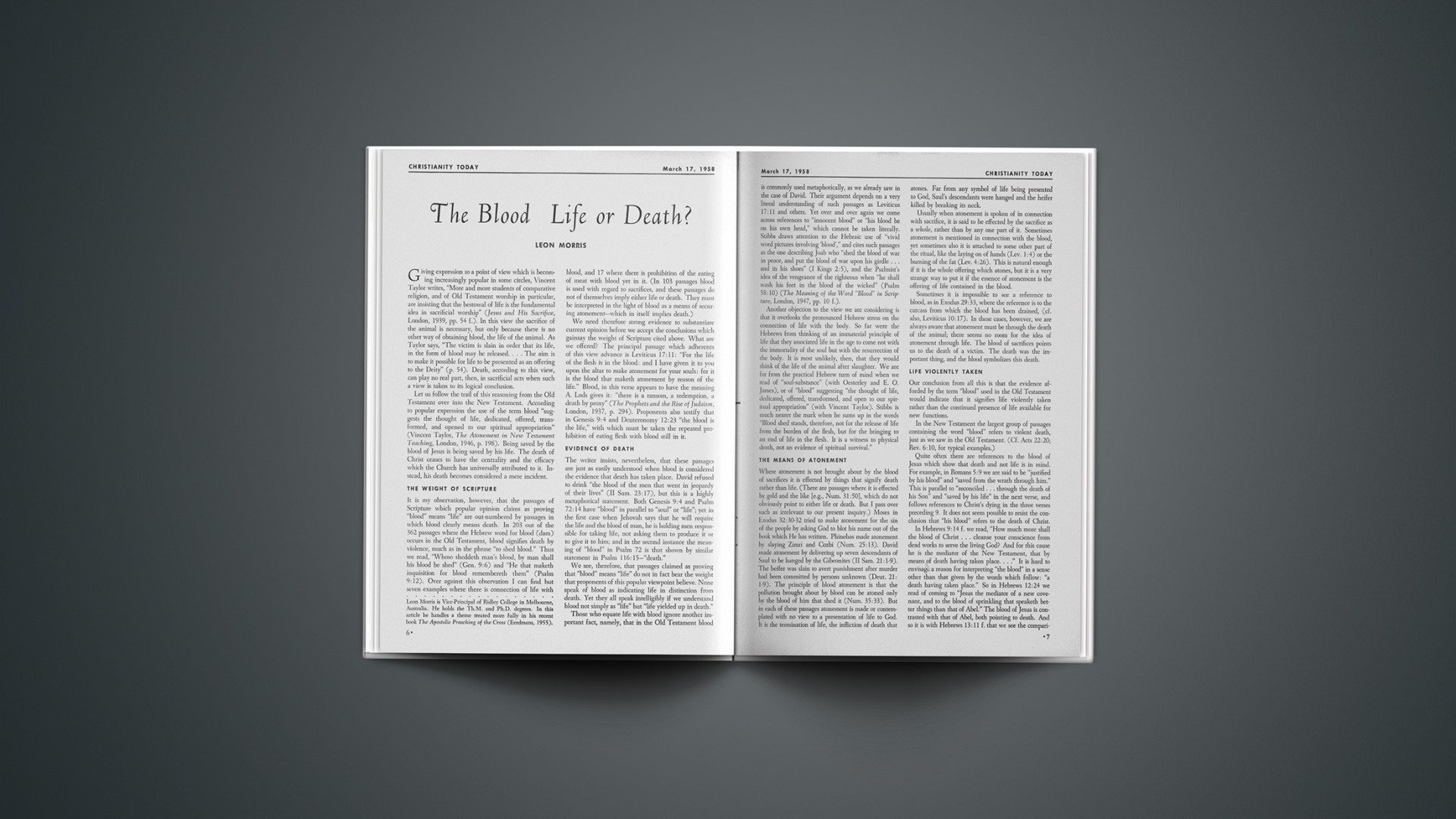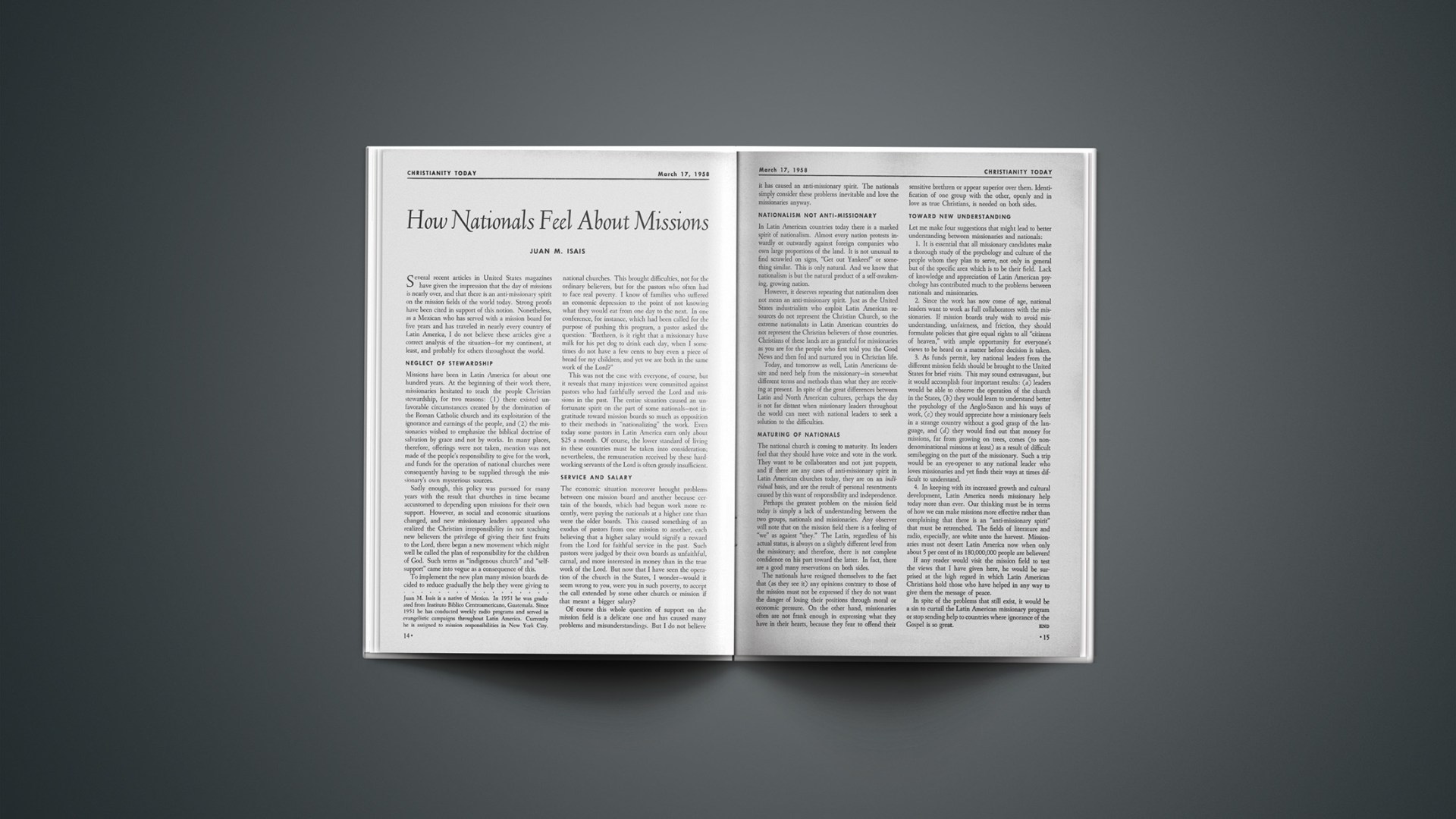ALL OUT FOR EASTER
Pastor Peterson’s Christmas peeve has carried over to Easter. He predicts that the Easter Bunny will soon be riding in Santa’s sleigh. There is scarcely time now for the clearance sales in between. The pastor is depressed by Easter fashions in pew and pulpit—the liberal spending of the first and the liberal theology of the second. We are indebted to him for the following selections from his forthcoming anthology All Out for Easter.
Flowers in the Pulpit
The eloquent Doctor,
To the pulpit born,
Wanders in the garden
On Easter morn
And, wreathing the garlands,
With poetic powers
He distils sweet odors
Of verbal flowers:
“Perfume everlasting
Wafts from springtime bloom …”
Preaching in the garden
He missed the tomb!
Absorbed in the glory
Lilies may afford,
He beheld no angels
Or living Lord!
Easter Observance
To observe Easter season
Will cost her much—
For that mad little hat as
A lighter touch,
For the strange new dress which, as
Fashion decrees,
Must be quite free of shape, like
A French chemise.
Yet she bears like a saint the
Financial strain;
She’ll adorn Easter’s pew if
It doesn’t rain!
These poems have been edited slightly. The first originally included the words, “… lost in the flowers he mythed the angels.” I am glad to say Peterson himself was dubious about the pun.
SAVING THE REPUBLIC
Your editorial, “Can We Salvage the Republic?” (Mar. 3 issue) … is eloquent, prophetic in the best tradition, and makes a number of points which are desperately in need of the kind of statement you have given them.
The Foundation for Economic
Education, Inc.
Irvington-On-Hudson, N. Y.
Is such a decline honestly such a terrible thing? Can I not have enough faith that God will lead the world finally to freedom without America being the power nation in the world? Perhaps there is a leading role for rich Africa to play in world affairs. Maybe the Middle East which once cradled civilization will again lead to world power. Perhaps even the people of Russia who know firsthand the tyranny of oppression and hate can and will one day break those bonds and show us all how precious is the sweet taste of freedom and lead the world.
Chesterfield, Ind.
Your blind criticism of the National Council is out of place in these perilous times when Christians must join forces to fight the common enemy.…
Franklin, Ind.
I am far from being in agreement with all the actions or pronouncements of the National Council; nevertheless I am convinced that the repetition of the unfounded and discredited charges of collectivism and socialism against the National Council, can only proceed from attitudes which are either bigoted or misinformed.
St. Luke’s Lutheran Church
Huntington Park, Calif.
• Perhaps an analytic survey of policy statements on social action by NCC (and its predecessor the Federal Council of Churches) is in order. CHRISTIANITY TODAY made no blanket “charges of collectivism and socialism against the National Council.” But it does not concede that those who have found leftist tendencies in some of its pronouncements have acted merely from bigotry or ignorance.—ED.
Congratulations on your editorial “Can We Salvage the Republic.” Excellent.… And, for the record I wish to call your attention to an error in fact. Frank Chodorov never was a socialist, on the soapbox or off. He was a soapboxer, but the torch he carried was the single tax, or rather the philosophy of Henry George, which is quite a different thing.
Berkeley Heights, N. J.
Undoubtedly, you have brought fire down on your head from the ramparts of the National Council of Churches, Rome, Labor and Government. But you do not stand alone in your convictions and analysis.
North Oxford Baptist Church
Oxford, Miss.
Your analysis of the situation America finds herself in today indicates an understanding that I wish more of our people possessed. I share your apprehension as to the future of America, unless present trends can be reversed.… It is refreshing to know we have a religious magazine that dares to sound a warning, even though it may fall on an unresponsive people as did that of prophetic voices of past generations.
Ozark, Ark.
It is the truest and clearest survey of the present situation and its cause I have ever read. As a Christian duty and American responsibility, it must be reprinted in tract form, so that it may be distributed by the thousands throughout our tortured and confused country.
Central Baptist Church
Dayton, O.
I can see in my mind’s eye the swing of the pendulum all across the broad area of religious thinking in America. And to be able to see in print an article such as this is gratifying.
Bethel Baptist Church
Olanta, S. C.
The statement about the government assuming many of the former functions of the Church … aroused my attention. The Church has been especially negligent in the field of charity. She freely accepts the gifts of her members but will do little in time of trouble even for her own. This is her greatest shame!
Churches could at least give an annuity based on a family’s previous contributions. Many would never ask for it; yet the troubled would take it because it would not be charity but a rightful return on their investment.
Cincinnati, O.
Your very splendid and to the point editorial … turned me very definitely as to sending in my subscription.… I have thought along that line many times, and still have a grave doubt in my mind that this nation can ever repent and return to the sound ideas of the founding fathers.
Paso Robles, Calif.
I believe that we cannot salvage the Republic because we are already too far gone. The Reformation doctrine of liberty of all of life under God, never took deep root in the new world.… Neutrality is one of Satan’s greatest inventions. Not Christianity but rather atheism predominates in the schools. In politics, no room for the God of the Bible. Unless we get together in earnest prayer and repent, we are doomed as a Republic.
Highland, Ind.
TOMORROW’S EVANGELISM
In J. Marcellus Kik’s outburst against Charles Templeton’s Evangelism for Tomorrow (Feb. 17 issue), one detects a vigorous attempt to defend the traditional evangelism of our day.…
But it would seem that Templeton has rightly revolted against our “one-shot” brand of evangelism which moves heaven and earth to evoke a “decision” and pats itself on the back for a job well done.
Even allowing for the book’s faults, I consider Kik’s article a bit too severe.
Bethany Baptist Church
Philadelphia, Pa.
Your … review … is indeed timely. As one who recalls affectionately Dr. Templeton’s early days in the evangelistic field, it hurts me to confess after two readings that (this) is one of the saddest books I have ever read.…
Dr. Templeton has succeeded in unfolding the danger of the pulpit in these crisis days, the weakening danger of skillful preaching that falls short of redemptive revelation.
Evangelist
Presbyterian Church U.S.A.
Geneva, Ill.
PRESIDENT OF THE WORLD
Let me throw a swift salute … for the grand good sense in the piece on World Government and Christianity (Feb. 3 issue). A world government—in spite of the great Einstein’s demand for it, to escape the perils of nationalism-gone-militarist with his baby atom-bombs—is suicide of the prophetic voice of the rare far-seer. I ask myself, when a ‘democratic’ world government is outlined (as by a U. of Chicago commission) whom would I vote for, for world-president? Exactly nobody.
Madison, N. H.
AROUSING PREACHERS
The article by Cannon and Everett (Feb. 17 issue) … interests me very much. Certainly there is deep need for an aroused public opinion on the subject. It seems to me that preachers need arousing more than anyone else. It is extremely doubtful that the vast majority of the brethren are acquainted with the type and volume of obscenity that has been flooding the country for a long time.
Monte Vista, Colo.
Pious churchmen may deplore trashy magazines, but how many churches, much less pastors, are … conducting detailed and realistic classes or programs on what … the … Biblical ideal of family is.…
Bellerose, N. Y.
Thanks for your significant Christian literature issue. The many excellent articles and the editorial, “Upturn in Evangelical Publishing,” have a combined effect of powerfully helping readers realize the importance of the written word of God. And the article, “Sex and Smut on the Newsstands,” is valuable for showing the tragic results that occur when writers do not stand under the prophetic judgement of God and are not guided by Christ.
Religious News Editor
The Nashville Tennessean
Nashville, Tenn.
Sincere appreciation for the two fine and enlightening articles titled “Why our Preaching Fails” and “Sex and Smut on the Newsstands”.…
These were among the best ever appearing in the pages of CHRISTIANITY TODAY.
First Church of God
Princeton, West Virginia
We … thank you for printing it and thank the men engaged in this repulsive task, which is so necessary for the welfare of our young people and our country.
Dayton, O.
A world of praise should be given to Ralph A. Cannon and Glenn D. Everett for their two-year study of vile literature on our newsstands.
Baltimore, Md.
(The) article … inspired me to attempt to launch a one-woman campaign here against these magazines.
… Encouraging is the fact that simultaneously with my interest, there seems to be a general awakening here to this evil.…
If there was ever a problem crying for action by ministers and church people, this is it.
Louisville, Ky.
I couldn’t help but think that were there more genuine preaching of the evangelistic type and less of the philosophy of men, a great deal of this stuff would not have the appeal to people in general as it does now.
Missouri Conference of Seventh-day
Adventists, Kansas City, Mo.
MANY-SIDED TRUTH
In … “Why Our Preaching Fails” by F. R. Webber (Feb. 17 issue), his … statement that all preaching should be “Christ-centered” is beyond dispute. But he makes the mistake so frequently repeated by extreme conservatives, in falsely charging that Christ-centered preaching is vanishing.…
… Christ-centered preaching … is preaching not only a theology about Christ and salvation; it is a presentation from the Scriptures of Christ’s full message, exemplified, to be sure, in a plan of salvation, but also by his life, teachings and personality, with direct application to modern problems of life.…
I have visited more than a thousand churches, speaking, counselling.… In nearly all of them—conservative, moderate and those sometimes referred to as liberal—I find, with varying success, a Christ-centered program, more effective in my opinion than a one-sided program of evangelism in the narrow sense. Truth is many-sided.
Lincoln, Neb.
It is interesting that Webber spends one full third of a column quoting a man who 70 years ago was saying what he is saying is true today.…
Fourth Avenue Christian Church
Columbus, Ohio
Would God that every seminary student and any other erstwhile preacher would take its message to heart.
First English Lutheran Church
Missoula, Montana
PLEA FOR SIMPLICITY
L. Nelson Bell’s … “Simplicity in Preaching—a Plea” (Feb. 17 issue) emphasizes a need which I have longed to express, and it does it far better than I probably could.…
There was a time when I preached that I searched for ideas and then tried to find Scripture to bolster up those ideas; now I go to the Word itself and simply invite my people to see what God has to say.…
Mexico Baptist Church
Mexico, Me.
PRESERVING THE DOLLAR
Thanks for your excellent editorial on inflation (Jan. 6 issue). It should do much to make clear that inflation is an increase in the supply of money and credit, and that government is directly responsible for it. Unwise action by both capital and labor certainly develops inflationary pressures. But unless government responded by increasing the supply of money those who seek wages or prices higher than the market will support, would soon bring unemployment and loss of sales upon themselves. That would quickly put an end to the spiral. Unfortunately, government responds to the pressure by increasing the supply of money and credit, as the purchasing power of the dollar falls lower and lower.
Unless our government changes its course, the dollar will eventually be destroyed as have most of the other fiscal units of the world.
Marble Collegiate Church
New York, N. Y.
I wish to congratulate you.… It is a clear presentation of one of the great dangers confronting our nation. So long as we have a currency whose value is subject to the whims of a handful of people who may be motivated at times by political expediency, the economic foundations of our nation are in constant peril.
The National Education Program
Searcy, Ark.
“MATERIALISTIC TRUTH”
Mr. Shen, in his comments on the Rev. Mr. Hebert’s book (Mar. 3 issue) … upbraids your reviewer … for “dodging the main issue,” … “Does the doctrine of verbal inspiration … not involve a ‘materialistic’ view of truth, or an intellectualistic conception of revelation? Can either of them be justified on biblical grounds?”
At least Mr. Shen has not subjected us to the entire gamut of cliches on this point, a good summary of which must include at least “Aristotelianism,” “Greek (vs. Hebrew) view,” “scholasticism,” and “rationalism” in addition to “intellectualism,” “materialistic view” and “Fundamentalism.”
Ever since Brunner and others have popularized the “Truth as Encounter” view, it has been the fashion to assert that truth is not factual correctness (the quality of statements of being in accord with reality), but rather some indefinable ectoplasmic “something,” which is now God himself, now Christ, now some relation between God and man, but never anything as definite as Scripture or doctrinal statements. Moreover these claims are habitually advanced in tones implying that they are so obviously self-evident as to be beyond question or necessity of proof. (Cf. the dutiful approval and unoriginal rehearsal of the neo-modernistic cliches in the Christian Century’s Nov. 27 review, by Dr. Marty, of Hebert’s book.) In fact, such proof is rarely even attempted. To question this modern dogma is to blaspheme the very mother of all of neo-modernism’s … sacred cows.…
These claims about truth have so permeated the theological atmosphere, that even many a conservative is embarrassed by the term “propositional truth” … and when the arrogant, proofless cliches begin to fly, these poor conservatives run in dismay.…
For which position is the stigma of “intellectualism” intended? Obviously for the traditional doctrine of the Church that Scripture does not merely contain, but by virtue of divine inspiration, itself is the infallible Word of God.… It follows since Scripture consists of words and propositions, that there is such a thing as propositional truth and revelation in theology.… The denial of “propositional truth” is a convenient device by which the whole obligation to be orthodox is with one stroke eliminated, and everyone is left free to “witness to” his own “encounters” as he sees fit. This is nihilism.…
Is the traditional doctrine “unbiblical?” Nonsense. Our Blessed Lord Himself asserts: “Scripture cannot be broken” (John 10:35). Note that (1) the reference is to a specific proposition, even one of relatively minor importance; (2) this proposition “cannot be broken” because it belongs to a specific series of propositions, explicitly recognized as “written,” and collectively known as “Scripture.” Or take the refutation of the Sadducees (Mt. 22:23ff.). Here our Lord (1) identifies error with definite propositions, not encounters, (2) opposes to these other propositions, and (3) establishes the truth in the matter not even with a direct proposition from Scripture, but with a mere, and shockingly Aristotelian, deduction from Scriptural propositions. St. Paul also identifies authoritative revelation with a collection of propositions, (2 Tim. 3:15 ff.)
Shocking! Christ and his holy Apostles represent the materialistic concept of truth! The fact of the matter, of course, is that this “concept” is not particularly or peculiarly materialistic, but is simply the common meaning of the term, as also Webster testifies. We can congratulate the atheistic materialists of our day at least upon a laudable amount of clear thinking, candid definition, and logical rigor, virtues which modern theologians should be advised to emulate.…
Redeemer Lutheran Church
North Tonawanda, N. Y.
NATURALISTIC ARROGANCE
The account of the recent meeting organized by the faculty of Chicago University School of Theology surprised me. The demand for a naturalistic Christianity seems to me not only intellectually arrogant, but also shockingly absurb.
Science has not, and never can exclude the supernatural.…
The natural sciences are indeed a great and important discipline of truth. If, however, their uniformed prejudice against the supernatural should succeed in discrediting a transcendent faith, their unfounding of freedom, and so of morality, may result in the violent end of modern civilization. I do not believe this will happen; but neither do I believe that men whose minds have been shut up to one discipline of truth are going to command the thinking of the second half of the 20th century. The risen Christ is the Lord of history, and He will find a way to undergird the Gospel which He instituted at such infinite cost.…
Brown Mills, N. J.
IN RE JONATHAN EDWARDS
Not long ago we visited with a Seminary classmate who has served for about two decades as Professor of Systematic Theology in one of the leading seminaries of our country, is the author of several widely read books on theology and is recognized as one of the most able theologians of our country and time. We spoke to him concerning the disproportionate emphasis being placed upon the mercy and love of God so prevalent today in pulpit and religious press, expressing the opinion that this is a chief explanation of the tragic let-down in morals marking our time, lawlessness and fact that there are comparatively few people now who fear God. The Professor replied that he shared my opinion and if time permitted he had it in his mind to write a volume on this subject.
Those who take a different view will be surprised if they will consult their concordance to see how many times the Scriptures mention the justice and wrath of God and enjoin the fear of God.…
It is a tremendous responsibility any teacher or minister takes who misrepresents the true character of God—perhaps sometimes through quest for popularity! Surely he would not fail to warn his friends of an approaching train or storm. “Faithful are the wounds of a friend.”
Erie Conference, Methodist Church
Townville, Pa.
THE TURNING POINT
I was particularly pleased with the Dec. 9 issue, containing Martyn Lloyd-Jones’ Christmas sermon and Earl L. Douglass’ … “Our Lord’s Virgin Birth.” I was Moderator of Philadelphia North Presbytery when Earl Douglass asked to be received by letter from a New York State Presbytery and become Pastor of Summit Church. At once there was a protest, and I urged Presbytery not to act hastily; and after he read a statement of his Christian faith, he was received and the call approved and placed in his hand. That, I take it, was the turning point in his ministry, and he and Mrs. Douglass became big factors in the Presbytery, and later on he took over Wm. T. Ellis Sunday School lesson job, etc.
Gettysburg, Pa.
LATE LAUNCHING
To me CHRISTIANITY TODAY is must reading. It is extremely stimulating, very evangelical, evangelistic—and just what I want, and need. It should have been launched years ago—many of them—when I was much younger—with more years ahead to use and profit by it.
Elmora Presbyterian Church
Elizabeth, N. J.

